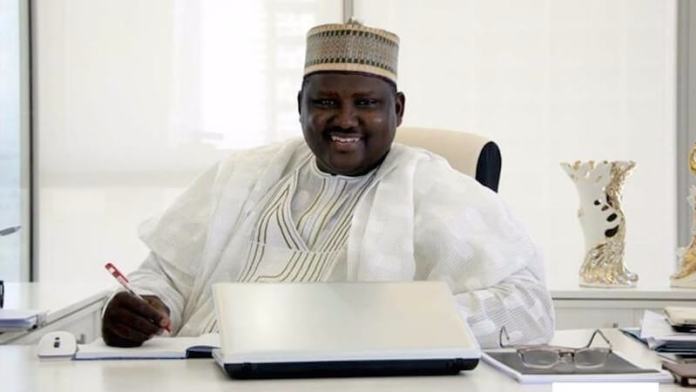- Maina: EFCC Finds £6m Pension Cash in UK Bank
Detectives have traced about £6m pension funds to a United Kingdom bank account being managed by the Office of the Head of the Civil Service of the Federation(OHCSF).
The cash is being suspected to have been tampered with by some government officials.
Two former Heads of the Civil Service of the Federation(Engr. E. Okeke and Prof. O. A. Afolabi) reportedly did their best to protect the funds from being tampered with.
Also yesterday, it was learnt that the Economic and Financial Crimes Commission(EFCC) had seized more houses believed to be owned by the embattled ex- chairman of the Presidential Task Force on Pension Reforms Task Team, Mr. Abdulrasheed Abdullahi Maina. He is one of the signatories to the UK bank account.
Besides, a former EFCC operative has been quoted as saying that he was prepared to speak up on how a minister contacted him to protect Maina.
But the operative said he would do so on oath if President Muhammadu Buhari raises a Judicial Commission of Enquiry into the mismanagement of pension funds.
At least N2b is said to have been misappropriated. There are other funds, which are believed to have been stolen.
A former chairman of EFCC allegedly collected funds for a foreign trip from Maina. But a fact-sheet has debunked the claim.
The purported N5,476,000 estacodes remitted to the former EFCC chairman was actually paid into an account in a first generation bank, according to sources close to the investigation of the multibillion naira pension scandal.
The EFCC has continued its manhunt for Maina. It has located more of his assets.
A source said: “Our detectives have linked a large farm in Keffi to Maina and we are going to invoke Interim Assets forfeiture Clause in the EFCC (Establishment) Act.
“We have also sealed off two of the suspect’s houses at No. A5 B. Close and No. 9A in Kado Estate in Abuja. We have located some houses in Maiduguri too.
“So far, we have taken possession of the houses in Abuja and Kaduna.”
There was a twist yesterday following the release of a fact-sheet, which states that no former EFCC chairman collected N5,476,000 for overseas trips from Maina.
The document said: “It is hereby stated categorically that the former EFCC chairman never received any payment whatsoever in respect of any trip in OHCSF/Police Pensions and neither embark on such trips.
“That Estacode payments to the tune of N5,476,000 purportedly made for the Executive Chairman was discovered to have been paid into the First Bank acct. No. 4033010067733 belonging to one Christian Madubuike who is an account clerk with Police Pension office (PPO).
“The money was subsequently withdrawn from his account and handed over to Mr. John Yusuf (AD Accounts PPO). However John Yusuf admitted receiving the monies but claimed that he remitted same to Abdulrasheed Maina.”
Meanwhile, the EFCC traced about £6m pension funds to the UK and uncovered 66 pension accounts in the Office of the Head of the Civil Service of the Federation(OHCSF).
There was suspicion that the £6m might have been tampered with by some government officials, who are now pension suspects.
The top source added: “The EFCC has done enough in unraveling pension fraud syndicate in OHCSF, Presidential Pension Reform Task Committee, Police Pension funds and the Nigeria Union of Pensioners (NUP) check-off dues among others.
The source said: “It is certainly a huge racket by civil servants some of who are still in the system. For instance, our team uncovered £6m pension funds in an account in the UK. The money was for the payment of the pensions of some British colonial officers who served in Nigeria.
A report on the said account in the UK said: “In respect of the Federal Government 6million pounds sterling investment in the U.K with Crown agents, it is worth noting that the information was discovered as a result of a search executed in the residence of Dr. Shuaibu Sani Teidi during the course of our investigation.
“Dr. Shuaibu Sani Teidi failed to disclose the account during his handing over when he was leaving the Head of Service. Mr. Charles Bornant was invited and he confirmed that Dr. Shaibu did not disclose nor include the account in his handing over. Investigation into the account is still ongoing based on relevant information at our disposal.
“During the course of investigating fraud in the Pension office of the Head of Civil service of the Federation (OHCSF), a search warrant was executed in the residence of Dr. Shaibu Sani Teidi (former director Pension Accounts) where a laptop was recovered. From the analysis of the computer laptop, a document captioned “Report of the visit to Crown Agents Investment United kingdom” was discovered.


 Billionaire Watch3 weeks ago
Billionaire Watch3 weeks ago
 Startups4 weeks ago
Startups4 weeks ago
 News4 weeks ago
News4 weeks ago
 News4 weeks ago
News4 weeks ago
 Bitcoin4 weeks ago
Bitcoin4 weeks ago
 Naira4 weeks ago
Naira4 weeks ago
 Forex3 weeks ago
Forex3 weeks ago
 Treasury Bills4 weeks ago
Treasury Bills4 weeks ago
























